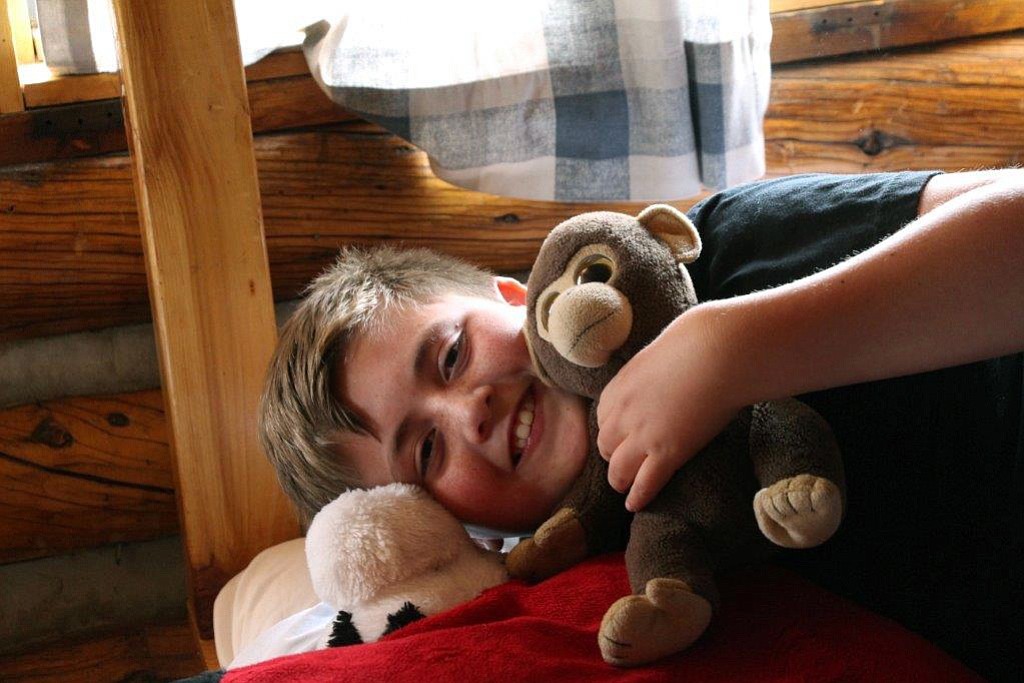Attending overnight camp for the first time last summer, 10-year-old Lily Becker longed to be back home in Chicago. She missed her parents and sister, wondering what they were doing and wishing she could hear their voices. She missed simply being alone in her bedroom.
“I was really, really homesick,” Lily recalled of her “painful” first half of a four-week session at Sanborn Western Camps: High Trails Ranch for Girls in Florissant, Colo. “It was kind of scary at first because I had never been away from home before for that long.”
Lily got through her homesickness with the help of friends, experienced campers who promised it would get better, and her counselors, and by pushing herself to focus on having fun in the present rather than dwelling on home.
“I set a goal for myself not to cry for five days,” she said. “I kept thinking about my mom and dad, and by thinking of them, I wasn’t having any fun because I kept crying all the time.”
Lily proudly held in her tears and began having such a good time that by the last day, she didn’t want to leave. “It was the best experience after those two weeks,” she said.
As hard as it may feel for campers — and parents who receive their tear-stained letters home — homesickness may be as common at sleepaway camp as sunscreen and color war.
“Homesickness is a perfectly normal human emotion,” said clinical psychologist Dr. Michael Thompson, whose book “Homesick and Happy” (Random House, 2012) reflects his belief that children can feel both while away at camp. “It means you have a home worth missing.”
Overcoming homesickness and spending time away from parents helps children gain self-assurance and independence, experts say.
“It inoculates them against future bouts of intense homesickness, like freshman year in college or the next year of camp, and it can teach them emotion-regulation skills that will be helpful throughout their lives,” says Dr. Christopher Thurber, a clinical psychologist who has researched homesickness and worked at camps for three decades.
Homesickness is often a longing for Mom and Dad, but can also be for a pet or pillow, home cooking or an activity like screen time.
“Just about everybody misses something about home,” Thurber says.
His research found that about 95 percent of kids who spent a week or two at an overnight camp felt homesick at least once, feelings so mild they might not have even called them “homesickness.” About 20 percent had moderate to severe homesickness, while 7 percent suffered the most intense homesickness, with possible signs of anxiety or depression, he said.
“Most of the kids who are bothered by it learn to cope with it — that’s a confidence-builder,” Thurber said. “For the few who experience it quite intensely, the staff are there to coach them through it.”
There are steps parents can take to reduce the risk.
Before camp, talk with kids about the possibility of homesickness and offer ideas for feeling better, like talking to a counselor or writing a letter home. “Many parents don’t want to bring it up because they think it will make it worse, but this is naive,” said Thompson, also a consultant to numerous overnight camps.
Lynda Bekore sent her 9-year-old son to camp in New Jersey for the first time five years ago with a way to feel close to home if he was homesick: Just before lights out, she said, look at the moon, and she would do the same.
Her son sounded homesick in his first letter, said Bekore, of Merrick, N.Y.: “I’m having a good time. At night I’m looking at the moon.” Several weeks later on visiting day, she was relieved that he had forgotten all about the moon and had needed to gaze upward only the first few nights.
Thurber suggests three more tips for parents:
o Let children practice being away from home by planning sleepovers with friends and grandparents (no texting or calling).
o Get the kids involved in planning and packing for camp so they feel ownership over the experience.
o Don’t agree to pick them up early if they ask to be rescued at the first pang of sadness.
“Parents need to say, ‘No. Absolutely not,”‘ Thurber said. “That might seem like tough love but it’s the very message kids need to hear. ‘This is your experience. You’re not going to be rescued.”‘
Some kids do leave camp early, and before that decision is made, Thompson suggests parents rely on the advice of the camp director. For these campers, their time at camp should be celebrated, rather than viewed as a failure.
Lily wrote her parents asking to go home, but they had agreed beforehand that was not an option. Reassured by the camp that her daughter was having fun, Lisa Becker, who attended the camp as a girl, was proud of Lily for sticking it out, and said her daughter returned with a new sense of independence and appreciation for home.
“She had a lot to overcome,” Becker said. “She was super sad, and I think it was a big accomplishment for her.”
Ariella Rogge, a director at Sanborn, says that even kids who are excited about being at camp “are still going to have moments they’re just blue,” Rogge said. “There’s that moment, and they write about it. Part of that coping skill is to write about it.”
Making a friend, mastering a skill and the simple passage of time can help cure homesickness.
“They develop competence in camp living, which gives them confidence in themselves and their ability to live without the help of their parents,” Rogge said.
Parents of children struggling with homesickness should respond “in a positive, optimistic way,” Thurber advises, and avoid sharing their own anxieties.
“Homesickness can be intense,” he says, “but it’s not lethal.”



